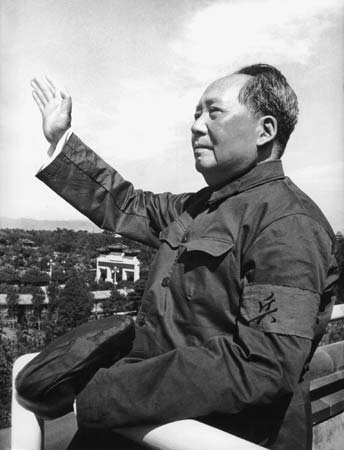Chen Boda (Chen Boda)

In 1951, Chen Boda wrote an article with the title Mao Zedong’s theory of the Chinese Revolution is the combination of Marxism-Leninism with the Chinese Revolution and a book entitled Mao Zedong on the Chinese Revolution. These works made him one of the most important interpreters of Mao Zedong’s thoughts, and in the 1950s he became Mao’s personal secretary and close associate, authoring several key policy documents. In 1958, he became the editor of the party journal Red Flag. During the Lushan Conference (July 1959), because Mao was no longer the president of the PRC Liu Shaoqi having taken his place (although he was still chairman of the CCP for some time), and as he didn’t want to lose credibility in front of the CCP, he used Chen Boda to criticise Peng Dehuai. From 1966 until 1969, Chen Boda was to play an important role in the Cultural Revolution. In May 1966, he was placed at the head of the newly formed Cultural Revolution Group, a body established to oversee and direct the course of the Cultural Revolution. In time, this group would rise to become the most important political body in China, surpassing even the Politburo Standing Committee in importance. Furthermore, Chen Boda was also placed as head of the Communist government’s propaganda machine alongside Jiang Qing when the previous leader, Lu Dingyi, was deposed in 1966. He also became a member of the Standing Committee of the Politburo. However, as the Cultural Revolution Group began to appear too radical for the liking of the leadership in Peking, its influence began to wane, and it was formally dissolved at the CCP’s Ninth Congress in the Spring of 1969. This marked the end of Chen Boda’s involvement in the Cultural Revolution. As the leadership became more moderate in its outlook and the initial aims of the Cultural Revolution were sidelined, Chen’s radicalism caused concern, and he was condemned as a ‘revisionist secret agent’ by the CCP’s Tenth Congress in 1973. After the Cultural Revolution, he was tried by the post-Mao government as a collaborator with the Gang of Four. He was sentenced to eighteen years in prison, but was released shortly afterwards due to his ill health. He died on 20 September 1989.
Born
- July, 29, 1904
- Hui'an County, Quanzhou, China
Died
- September, 20, 1989
- Beijing, China

